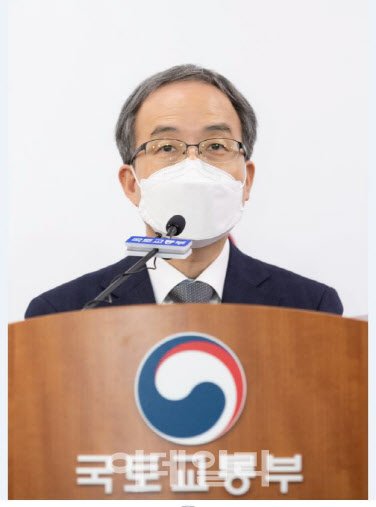|
Kim Soo-sang, head of the Ministry of Land, Infrastructure and Transport, head of the Department of Real Estate Evaluation of the Ministry of Land, Infrastructure, and Land, Shin Kwang-ho, and the head of the Korea Real Estate Agency, Son Tae-rak, held a briefing at the press room of the Ministry of Land, Infrastructure and Transport, and revealed the government’s position on the recent controversy over the recent surge in public prices.
This is a measure of refutation as the previous day, Governor Won Hee-ryong and Seocho-gu Mayor Cho Eun-hee announced a joint proposal to improve the publicly available real estate price system at a press conference. Earlier, Governor Won and Mayor Jo Gu held a press conference in Yeouido, Seoul the day before, and announced the results of their own verification.
According to Jeju-do and Seocho-gu, a quoted price error was found in one out of seven apartment houses in Jeju Island. Seocho-gu checked the public price realization rate (market price reflection rate) of 4284 cases of 12,5294 apartment houses in the jurisdiction that had transactions last year, and as a result, the public price of 2 out of 10 households (19.8%) was 80% or more of the actual transaction price, and 100% or more. The place was 136 households (3%).
Based on this, Governor Won and Mayor Cho requested the Ministry of Land, Infrastructure and Transport to △disclose the basis for calculating the published price, △stop calculating the published price without on-site investigation, and conduct a full reexamination △Establish a published price verification center by the local government, and △Transfer the authority to determine the published price to the local government.
However, the Ministry of Land, Infrastructure and Transport said that the official prices for Seocho-gu and Jeju-do were properly calculated. “The official price of apartment houses released on March 16 was investigated by the Korea Real Estate Agency,” said Susang Kim. “The market price that forms the basis of the official price is the price of the end of 2020. Appropriate actual transaction examples and various price information Since it is a comprehensive analysis of the trend, it is not valid to argue that the official price of some apartment complexes in Seocho-gu was calculated higher than the actual transaction price,” he said.
For example, Seocho-dong A apartment, a 31-pyeong new construction that started moving in in 2020, recently traded for 1.26 billion won, but considering that the 26-pyeong apartment built in 2017 was actually sold for 1.7 billion won, it is difficult to see this as an appropriate market price. It’s an explanation. Manager Shin Kwang-ho added, “When calculating the price, the case of transactions in nearby complexes was reflected, and excessively low transactions were not considered based on the market price.”
It is explained that there is no problem with the case of’error in which the quoted price for a specific line in the same building increased and a specific line decreased’ presented by Jeju Island. This is because even within the same complex, the rate of change in the disclosed price may vary depending on the area, the characteristics of each floor, and the trend of the actual transaction price in the previous year.
Regarding the promise of a 10% cap on the disclosure price proposed by Candidate Young-sun Park, he expressed concerns about equity. The Ministry of Land, Infrastructure and Transport said, “The reason for establishing the actualization plan for disclosure was to achieve fairness because the market price reflection rate itself may vary. Even if the disclosure price calculation is entrusted to the local government, the disclosure price market price reflection rate will vary according to the characteristics of the local government. There is a concern that there is a possibility that the related law has not been processed.”
“The public price must be determined according to the public price method, and it must be calculated by reflecting the appropriate price,” he said. “If a separate cap is put on the public price, it is not fair enough, so the disclosed price itself is correct to be calculated objectively. If the public price is not raised by more than 10%, it will not be able to reflect all the market prices, and there may be a difference in the price reflection rate as much as those who cannot increase the price.” If you are concerned about the excessive tax burden, it is explained that it is better to use the tax burden ceiling rather than the official price adjustment.
The number of submissions of opinions on the published prices that ended the day before was forecast to be around 3,7410 last year or more. An official from the Ministry of Land, Transport and Maritime Affairs said, “Because a large number of group complaints are sent by mail, the number of opinion submissions has not yet been collected.” He added, “The exact figures are scheduled to be compiled after April 8th, and we will disclose the results of processing on the 29th.”

